Monika Schaefer
The Flipside with Monika
Ep 20 with Kathleen Dudley
Sat, Nov 16, 2024
[In this weekly podcast episode The Flipside with Monika on Republic Broadcasting Network, Canadian nationalist and author, Monika Schaefer talks with Kathleen Dudley.
Key points include:
The host Monica Schaeffer introduces her guest Kathleen Dudley, a Canadian-born American citizen living in New Mexico (0:00-2:00)
Kathleen is described as “a poet, a singer, a healer, musician… a writer” with many talents (30:00)
They discuss the misuse of the term “fascist” as a weaponized label (3:00-5:00)
Kathleen explains fascism means “nationalizing” and “control of a nation by its nationals” (7:00-8:00)
Adrian Arcand, a Canadian fascist politician, is discussed as explaining fascism clearly (9:00-11:00)
Fascism is described as affirming tradition, high culture, God, family, and free enterprise (12:00-14:00)
Communism is portrayed as the opposite of fascism, denying God, freedom, and private property (14:00-15:00)
“Fascism is basically nationalism” and is demonized by those opposed to ethnic loyalty (16:00-17:00)
Adrian Arcand spent 6 years in a Canadian concentration camp during WWII (20:00-21:00)
Ezra Pound is mentioned as an American poet who supported fascism in Italy (23:00-24:00)
Kathleen suggests embracing the term “fascist” positively: “Thank you, I’m a fascist” (32:00-33:00)
They discuss how weaponized language is used to manipulate people’s emotions (34:00-36:00)
Kathleen has been deeply reading Aleksandr Solzhenitsyn’s works, especially “The Gulag Archipelago” (40:00-45:00)
Solzhenitsyn’s experiences in Soviet gulags and his method of memorizing his writings are described (45:00-47:00)
“One Day in the Life of Ivan Denisovich” is mentioned as Solzhenitsyn’s first published work (48:00-49:00)
The publication of “The Gulag Archipelago” led to Solzhenitsyn’s exile from the Soviet Union (50:00-51:00)
Solzhenitsyn’s Harvard speech warning of “communist aggression and the weakening of the moral fiber of the West” is recommended (52:00-53:00)
Kathleen received Solzhenitsyn’s book “200 Years Together” about “the Jewish problem in Russia” (55:00-56:00)
A caller mentions a 1944 letter about distracting public attention from “the doings of The Red Army” (57:00-58:00)
– KATANA]
https://www.republicbroadcastingarchives.org/the-flipside-with-monika-november-16-2024/
https://freespeechmonika.com
https://gab.com/MonikaSchaefer
https://odysee.com/@MonikaSchaefer:2
Monika’s book: https://barnesreview.org/product/sorry-mom-i-was-wrong-about-the-holocaust/
Published on Sat, Nov 16, 2024
Description
By RBN
November 16, 2024 20:00
Related Articles
The Flipside with Monika, July 20, 2024 2 20.Jul
The Flipside with Monika, October 12 , 2024 3 12.Oct
The Flipside with Monika, July 6, 2024 4 06.Jul
Podcast: Play in new window | Download
Subscribe: RSS
Episode 20: With guest Kathleen Dudley, we discuss Fascism – what is it actually?
Kathleen also talks about her deep dive into great Russian writers, in particular, Aleksander Solzhenitsyn.
Social media
Share this article
Print this article ✉ Send e-mail
RBN
By RBN
November 16, 2024 20:00
Write a comment
NO COMMENTS
No Comments Yet!
_____________
Following Transcript Quality = 5 Stars
1 Star — Poor quality with many errors, contains nonsense text 2 Stars — Low quality with many errors, some nonsense text. 3 Stars — Medium quality with some errors. 4 Stars — Good quality with only a few errors. 5 Stars — High quality with few to no errors.
NOTE: Readers can help improve the quality of this transcript by putting corrections in the Comment/Leave a Reply section. Don’t be just a consumer, contribute to the cause, however small. Thanks.
TRANSCRIPT
(Words: 7,737 – Duration: 60 mins)
[Intro music]
[00:34]
Monika Schaefer: All right, greetings. Hello everyone. Good day. Good afternoon wherever you are. Today is November 16th, 2024. You are listening to the Republic Broadcasting Network at RepublicBroadcasting.org. This is episode 20 of The Flipside with Monika. I am your host, Monika Schaefer.
And today I am absolutely delighted to have a guest who is a very good friend of mine, Kathleen Dudley. She was born and raised not too far from where I grew up near Edmonton, Alberta, in a small town just north of there, but now is residing in the United States, in New Mexico, in fact, and has been, I think you became an American citizen quite a few years ago.
Before I bring Kathleen on, I’ll just remind the listener that this is listener supported. So if you possibly can support the Republic Broadcasting Network, go to the website@republicbroadcasting.org and you will find the donate button there. And there are different ways of donating, either directly or by supporting the sponsors.
And I always encourage people also to share these shows, tell other people about the Republic Broadcasting Network. There are many good shows on this network and you’re not going to hear this kind of stuff on the mainstream media or what some people call the “Mockingbird Media”. Okay.
And I will also tell people about the chat room. It’s at the flipside w.monica.chatango.com and you can share things there. And I share things there from time to time. And yeah. So I wanted to tell you about that.
Okay. So Kathleen, are you there? Can you hear me?
Kathleen Dudley: I can. And thank you very much, Monika. I’ve been looking forward to this and what a surprise and a privilege and a joy.
Monika Schaefer: Thank you. Well, I’ve been looking forward to this for quite some time. This has been sometime in the making, I think we could see. I’ll just tell the listener a little bit about how we first met. You interviewed me. You were producing some content. You had a YouTube channel and I think you still do, although probably a lot of the videos that were a little bit more in the forbidden territory. You have, I think, an Odysee channel or maybe you can tell us about that in a moment. But where you have most of your content. And you were interviewing me. That’s how we first met.
And then you ended up in your own big battle. It had nothing to do with World War II history, like my big court epic, you know, battles. [chuckling] But I found it quite amusing, to tell you the truth! It was rather amusing. That doesn’t matter what somebody’s trials and tribulations are about somehow there seems to always be a jew in the mix that brings in the Holocaust into it! [chuckling]
And the background to that is that I attended your trial, but it was virtual trial. Everybody was on Zoom and there were a bunch of people visible on the screen. And at some point, one of these people on the other side of things was pointing out to the judge:
“Oh, there’s somebody there on, in the witness in the room here, like on the Zoom screen. Do you know who that is?”
And I can’t remember exactly how they put it, but it was really quite comical, if you ask me, that somehow they managed to bring the Holocaust into it because they were pointing at me, my presence there and that I am, you know, quote, unquote, “a Holocaust denier”.
So this was supposed to smear you by association, which., … Well, there you go. Even though your trial had nothing to do with the Holocaust or World War II history, it was about other things.
But that’s not what we’re here to talk about today. Unless you wanted to share, you know, any background about that, Kathleen, because I know that in your process of going through the court system, you learned a lot! Do you want to talk touch on that at all?
Kathleen Dudley: Well, not unless it comes in indirectly in the rest of what we’re talking about. I think I’d rather stick to our plan, thank you.
Monika Schaefer: Yes, well, that’s the thing, our plan. Actually, Kathleen had approached me a few weeks ago and said:
“Well, I’m really looking forward to when you have a guest on that’s going to explain somebody who’s really an expert on fascism. Who can tell us what is fascism, what is that?”
And here we are today and it’s you and me talking about this subject of fascism because we, we’ve talked about this a little bit and you know, this term “fascist” is a term that is thrown around, bandied about willy nilly, constantly, all the time. And I would guess that 99% of the people who use that term just willy nilly to basically, if somebody’s bad:
“Oh, they’re a fascist!”
Or if some government or politician:
“Oh, that’s a fascist!”
You know. [chuckling] And I don’t think they have a clue what is fascism. So we both kind of dug into that a little bit, although I think you did more than I did.
So that’s what we want to unravel today a little bit. What is that? I mean, is fascism, does that deserve to be used as such a weaponized label that just means something really bad and what do people actually mean by it when they call somebody a fascist? I really think they have no clue. What do you think, Kathleen?
[07:19]
Kathleen Dudley: Well, I tend to agree with you. I think words are weaponized, as we know, and they’re the grimoire, the book of magic spells and incantations. And we’ve seen that you use the word “Trump”, and all of a sudden someone goes ballistic, or you use the word “Nazi” and someone goes ballistic.
But more than that, a picture, an image is created in their mind, and it evokes emotions and there’s no thought. It bypasses the reason. It bypasses the brain. It bypasses the capacity to be logical.
And that’s how words have been used. And they’ve been used that way for hundreds and hundreds of years. And fascism is one of those.
And so when I first talked with you about this, Monika, I said there’s two words, Nazi and fascist. And I said:
“Both of those need to be really torn apart and explained.”
And fascism has been on my radar. And between the two of us, I now have a sense that I understand “fascism”. And I’d like for other people to understand it so that they don’t get caught into that incantation, that spell, that grimoire of the word. Because how we use language expresses our clarity and our understanding of life. And if we aren’t clear with the use of our language, then we’re not clear in the direction in which we walk in life.
So to me, it’s critical. What’s your thought on that?
Monika Schaefer: Absolutely! Before I got a little bit of a deeper understanding of what is fascism, Because I’m still certainly no expert on it, but I do know a little bit more now than I did even just a short while ago. I still had the feeling, though, that people were using it wrongly and that it was just another one of these demonized words like Nazi. A demonized, you know, weaponized word. What does it actually mean?
And so I would say to people, when they use that word, or even people who are in our community of truth tellers and people who seem to know that were being lied to about this and that, but they would still use that word. So to those people, I would say:
“Look, I think that that word has been wrongly vilified and used, even though I myself did not yet know really what it was, but I still had the sense that they shouldn’t be just calling somebody a fascist if in the sense that, oh, that’s bad. You know, they’re bad.”
And so, yeah, it, we do need to stop people in their tracks when they’re using it, when we know that they should know better.
So that’s our mission today, to bring that out a little bit. Why don’t you talk a little bit about. Oh, well, in our, in our discussions we were talking about Ernst Zundel and then who was Ernst Zundel’s mentor? Adrian Arcand. And that’s the man who really helped Ernst Zundel wake up! And in his own words, he felt “born again”, born again to the truth! Adrian Arcand, he is a Canadian, was a Canadian man. He’s no longer alive. That was a while back. And he did, I think it was like a 10 minute talk that we both really liked because he explains fascism. Do you want to tell us a little bit about that?
Kathleen Dudley: Sure. Adrian Arcand was born in 1899 and he died in 1967. He was a politician and a writer and a journalist.
And the interesting thing is, of course, when you look at the jew Wikipedia, you know, he was a “fascist” politician. You know, it’s like name calling. It’s juvenile use of words, because it’s not meant in a descriptive way, it’s meant in a demonizing way.
So when he was interviewed, and I love this interview because it made it very, very clear.
And if you do a deep dive and you go on Wikipedia and you go on to the online dictionaries, the story of what fascism is so convoluted. What he says is:
“Fascism means nationalizing.”
He said it is:
“It’s the control of a nation by its nationals.”
And then you go:
“Oh, what’s a national?”
“So it’s having or expressing strong identification with one’s own nation and vigorous support for its interests, especially to the exclusion or detriment of the interests of other nations.”
So, for example, as a German born woman, while you’re a Canadian born, but you’re of German ancestry, you might have very strong nationalistic identification for Germany and its culture as it was. Would that be correct?
Monika Schaefer: Yes. Basically fascism is nationalism.
And it’s important to distinguish the word nationalism from patriotism, because nationalism means nationhood. And nationhood means your ethnic racial group. This is what you are loyal to this is who you want your country to be, geared towards the benefit of your people, basically.
And so now that really would explain why in our mainstream, you know, weaponized lingo that’s been foisted upon us, that word has been turned into a weaponized label that is just so demonized! Because, I mean, who is it that owns the banks and owns the media? It is jewish. You know, it’s organized jewry. It’s jews who don’t like fascism precisely because it is basically an opposite of their agenda. It’s people working in their nations for their nation. And if your leaders are fascist, that’s a good thing. They are working for our interests in our nation and our nationhood. Back to you, Kathleen.
[14:26]
Kathleen Dudley: Okay.
And so what’s most interesting, too, if we look at what is happening today, to identify as a White woman, to identify with my ancestral origins, is considered very negative. That I could be considered a criminal in one way or another. It’s leading in those directions.
[See: What World-Famous Men Said About the Jews]
Now, one of the things that Adrian Arcand said was that the First World War was a revolt against the high culture and civilization of Germany. And it was to implant communism in Russia. And so that was what the First World War was about. And it was the most strategic place in the world because it was touching Europe, the Near East and Asia.
And then the Second World War, it widened the scope of communism, it spread it, and it smashed down the empires of the Western world. Now high culture is what has been targeted by the Bolsheviks, the jews, both in Russia in the Bolshevik Revolution and World War I and World War II in Germany. And we see today the Christian ethics being absolutely trounced upon.
So one of the things that Adrian Arkan looked at was what was happening right at the time he was in Canada and doing his work as a journalist. Rene Levesque was powerful at that point in time as well. And I remember, as you mentioned, I grew up in Canada. I remember his party. He was hard Left. And he described that he himself was far-Right. And he said, and this is defining fascism in a broader sense. And he’s saying:
“The Right affirms the sum total of tradition, which is made of high culture. And high culture consists of music and the arts and literature and science and mathematics. And it’s about revering these cultural classics.”
And he said:
“It’s also about the existence of God, the existence of a human soul and the dignity of man and freedom, private property and the sacred rights of family, also of free enterprise, the free activity of free men and free markets.”
On the opposite spectrum of socialism, where Rene Levesque was postulating and socialism was defined by the Soviets, it denies God, it denies the human soul, it denies freedom, the dignity of man, it denies the sacred rights of family. It denies free enterprise. It denies private property and private initiative.
So if you take a look at everything on the Left having to do with socialism, which in essence was the precursor to communism, which is Marxism, it’s all negative. And there was no substitution, there was no alternative.
Whereas on the Right, it’s about family, it’s about high culture, it’s about valuing individuality.
And so all we have to do is take a look at, here’s this man who’s been claimed and called a fascist, and he acknowledges that he is, but his values are the values that are of very high morals and ethics. And I would be proud to walk beside and be a part of his legacy, which I feel like I am. And I’m proud to know that fascism, in fact, is a very positive and important word that embodies Christian ethics.
So if you take a look at who’s throwing the daggers at the fascists, it’s the communists! It’s the Marxists! They’re the ones.
And as I was doing my reading and looking at definitions and articles on fascism, the editors or the authors of those articles were, in one case, a Sephardic jew. And who is building Wikipedia on our computers?
So here we have a very clear explanation, in my opinion, of the difference between fascism and communism.
Monika Schaefer: Basically, they’re polar opposites. So fascism, …
Kathleen Dudley: Exactly!
Monika Schaefer: It just sounds to me like fascism is the opposite of communism! And when you say you would be honored to walk beside this man, you’re talking about Adrian Arcand, are you?
Kathleen Dudley: Yes!
Monika Schaefer: And let me just mention that Adrian Arcand spent six years in a concentration camp.
Now, when I heard that, I thought:
“Oh, I just assumed in Europe.”
Like, somehow I didn’t know why. I didn’t know that much about him. I didn’t know why in Europe, but I just thought, well, that’s where these concentration camps were that we all have heard about so much. But, no, he was in a concentration camp in Canada for six years during the war.
Now, the war didn’t last six years, so did he go into the concentration camp? Was he pulled in? You know, was he arrested and thrown in there before the war?
Kathleen Dudley: Yes.
Monika Schaefer: Or did they just keep him? Is that correct?
Kathleen Dudley: I think it was 1940.
Monika Schaefer: Oh. So after the war began. But then they held him in there for six years in a Canadian concentration camp. That blew my mind! I didn’t even know that that existed. Although we’ve all heard about the camps for the Japanese and that. But here was this French-Canadian guy from Quebec, right?
So, yeah, but he was a fascist, which is the polar opposite of communism, and communism is what the Bolsheviks were. And we know that that was overwhelmingly a jewish operation. And even the jews say it themselves basically that:
“Judaism is communism and communism is Judaism.”
So that’s one and the same thing. So we could just call it what it is.
Kathleen Dudley: Right. And so here we do have this name calling, and yet it is actually a compliment if you believe in God, if you believe in the sacredness of family, if you believe in individuality, if you believe in free market enterprise, if you believe in the right to own property.
So why would someone be hurling the word “fascist” against someone with spit and venom, when in fact it’s really an accolade? It’s such a positive characteristic!
And if you look too this has been going on for so long, and fascism originated from my reading in Italy. And Ezra Pound, who most people will know and will be very familiar with his Cantos and his famous poem on usury, Usura. He was an American poet and he had many protege. He had T.S. Eliot and Ernest Hemingway. And my mind goes blank on the others, but there were four Pulitzer Prize winners, and he was never awarded that Pulitzer Prize himself.
But he went to Italy, and during the wars, he was doing broadcasting, exposing the communist spread that was taking place in the Soviet Union as a result of the Bolshevik Revolution that hit in October 1917. And after the war, he was imprisoned by the US military and was kept in an iron cage. And then he was declared insane and put in St. Elizabeth’s Hospital in Washington, D.C. Where he wrote his most famous work, the Cantos. And finally he was released through the help of his friends. One was Ernest Hemingway. But we see how demonized, how threatening words are.
And so if you can take a word and twist it, turn it upside down, flip it, the flipside, right? And if people don’t do the deep dive and really look at, well, what does that word mean, then they become under the spell, that grimoire.
And so it’s our responsibility to pull apart everything that is being used against us so that we can shine light on it and walk proudly, knowing that with fascist beliefs, we are honorable people with integrity.
[25:08]
Monika Schaefer: Well said, Kathleen. That is so well said!
In fact, from now on, when somebody throws that word around, going to say:
“Thank you, I’m a fascist. That’s a wonderful thing to be!”
And then if it’s people who are throwing that word around unknowingly or ignorant of the meaning of it. Because like I said earlier, even people who understand the truth about the “Covidocaust” or about the “Holocaust”, they understand they’re kind of most of the way there in terms of waking up to many of the lies around us.
I mean, I suppose we’re always learning more and more, but they will still bandy about that word. And to them, that would be very effective, especially to them, because it will stop them in their tracks:
“Say what? What do you mean?”
And then it gives us the opportunity to explain this word in the shortest form, you say:
“Well, it’s the opposite of communism.”
And then we can expand on that and wow, that was a wonderful explanation. Yeah, really good!
And I just want to say before the bottom of the hour, and I should have done this at the top of the hour when we began, but I really was just coming off of the previous hour with Frederick C. Blackburn on his Saturday Snack Shack.
And I encourage listeners, if you don’t already tune into his show, you really should because it’s just such a great show and you can always find it in the archives.
So I was a little bit, not completely my brain was still sort of wired on that. But I just wanted to say, Kathleen, a little bit of background on my friend Kathleen. She’s a poet, a singer, a healer, musician with, I think, several instruments, a writer. And you have many talents and skills that I think you should name a few more because I think I only just touched on those things. But the healing really intrigues me. You have a lot of knowledge on healing ourselves, and that is a very, very wonderful and important skill to have. And maybe you can share with people where they can find you if they are seeking healing help, for instance, because I know that you do this as your work.
Kathleen Dudley: Well, thank you, Monika. Yes, I’m a reflexologist. I’ve also studied homeopathy and a lot of herbs and nutrition. And I have a website, it’s katdudley, KATDUDLEY dot com, and you can find me there.
And I’m also a builder of steps and, …
Monika Schaefer: Construction, we’re talking about?
Kathleen Dudley: Yes. And carports. And I love to build as well, so I have a strong intellectual draw, but I love the physical as well. I’m spreading large rock at the moment and rebuilding rock walls, so it helps keep me spry. [chuckling]
Monika Schaefer: That’s wonderful! [chuckling] Yeah. It actually just was so much fun for me to see the things you are building. And I’m thinking:
“Wow, that’s really very nice that you just take this on, you learn how to do it and you obviously must have acquired a few tools and just go at it!”
That’s great!
Kathleen Dudley: Thank you. Before we go to the break, I wanted to mention one thing that Adrian Arcand said in his, in that interview. He said:
“He said there is no anti-semitism. It never existed! He said it is a natural reaction against an assault of anti-gentilism which is non-jewish.”
He said:
“It’s a jewish conspiracy because I read it from jewish authors!”
Monika Schaefer: That’s great! [chuckling] That’s beautiful, Kathleen. Okay, hold on everybody. And we’ll be back in a few minutes.
[29:34]
[ad]
[36:00]
[music]
[36:58]
Monika Schaefer: All right, I’d like to welcome you all back to The Flipside with Monika. And I would like to first of all, give out the numbers. We invite people to call in the second half of the hour.
So the number you can call in is 512-248-8252. That’s 512-248-8252 or 1-800-313-9443. We invite you to join our conversation with Kathleen Dudley and myself. And I’d also like to remind you that if you have the means, if you can possibly support this network because it is listener supported and some older equipment, I know that they’re looking to replace some of their older equipment.
But anyway, during the break, Kathleen and I were kind of laughing about the fact that she had asked me to have a guest that would explain these words, “fascism” and some of these other words.
And I said to her, well, careful what you wish for, [chuckling] because here she is and she’s doing a marvelous job of explaining the fascism and fascist, the whole concept of that.
So, okay, Kathleen, why don’t we carry on with that discussion? And we had mentioned that there are some other words as well that we could go into that perhaps people don’t have really the best understanding of well, one word that came to mind right at the beginning that you mentioned already was “Nazi” and we know there’s a history of that. It was actually a jew who put that word into the lexicon to denigrate the National Socialists. Do you want to talk about that a little bit?
[39:02]
Kathleen Dudley: Well, I haven’t done the deep dive on that.
Monika Schaefer: Okay.
Kathleen Dudley: But one of the things that I found very interesting from Adrian Arcand was that he said that the term “fascism”, when it arose in the 1920s in Italy, the word “Nazism” arose in Germany, but that that had to do with Nazi-lism Nazi-nationalism, and that it was really about nationalistic perspectives expressing strong identification with one’s own nation and vigorous support for its interest. So I was quite surprised by that.
And then also in Spain, there was another term using their Spanish language, which I don’t recall. So that’s really all I can contribute at this moment.
Monika Schaefer: Okay. No, but that’s even just that about the Nazi-lism with the “l” in there. So nationalism. And that is that word that the Bolsheviks, the jews, they don’t like that concept of nationalism. And that would be like fascism. That would be so that’s why those words are so demonized! And anybody that does anything bad these days is called a Nazi, or a fascist. That’s why those terms are so demonized!
But you know that this is something that I am very, very interested in and have talked quite a lot about. My brother Alfred talks about it a lot, is our language and how our language has been so turned against us to compartmentalize our brains, to stop us from thinking straight, to frighten people, to make people think:
“Oh, we can’t talk about that. And we can’t talk about this!”
And make people scared to say anything anymore. And that’s all it is, really.
And so if we can take these words, first of all, to clarify in our heads that they are just weaponized words, and in most cases, they actually have been turned upside down to mean the opposite. Like you illustrated so well with the word fascist.
And then, you know, run with it. When somebody calls you something bad like this, say:
“Thank you. Thank you for noticing!”
It’s surprising how quickly it takes the wind out of their sails. You know, if somebody says:
“Oh, you’re an anti-semite!”
“Oh, thank you. Thank you for noticing. Yeah, you should be too!”
Something like that. [chuckling] Right? So it’s what we do with these epithets thrown at us that we can kind of change the discourse. What do you think about that?
Kathleen Dudley: Well, and people don’t even know that Semites are Arabs.
And so when you say you’re anti-semitic, you’re against the Arabs, well, that doesn’t even make sense because we’re talking about the jews and we’re talking about the Sephardic jews, and we’re talking about the Khazarian jews. We’re talking about. We’re not even talking about the biblical jews because the Hebrews, the descendants of that is so minuscule today.
And so the jews that have evolved to today have moved into countries, have moved into religions, have moved into businesses. They’ve basically taken on the sheep’s clothing that the wolf is wearing. And it’s been done slyly, very cleverly. And so everything has been done with duplicity. And that’s what we’re finding as we unbury the garbled of these words, the grimoire, the confusion.
And so once we find the truth in all of that, then we can shine the light on it. And that is what the rats in the center of the room don’t want. They’ll scurry to the edges.
Monika Schaefer: Yes, they will.
Now, Kathleen, there is something else that you have been doing over the last few months. I think you’ve been doing a lot of reading, and once you started, you just couldn’t get enough. Why don’t you tell us a little bit. What got you started in this direction? I won’t mention. I’ll let you talk about what have you been getting into so deeply reading, reading, reading lately? Tell us, please.
Kathleen Dudley: Okay. Well, I’ve always been a reader, but in January of 2023, I did a deep dive on 19th century and, 20th century writers, which introduced me to Ezra Pound and all of his contemporaries, T.S. Eliot, Robert Frost. And then there were quotes by Aleksandr Solzhenitsyn in that. And I was in the courts at that time.
And so there was tremendous angst and tremendous pressure and assault. And I needed a place to be able to go for truth and for some sense of a spiritual lift. And I was talking to a friend and he had been reading The Gulag Archipelago by Aleksandr Solzhenitsyn.
And I thought:
“Okay, it’s time for me to read him.”
I remember when he was exiled from the Soviet Union, and it’s time, it’s just time. And there are three volumes of the Gulag Archipelago, and I started diving into them.
Now, at that time, I was being threatened with imprisonment. And so I was trying to figure out how this arrest was going to go. And curiously, the first chapter in the first volume of The Gulag Archipelago is called The Arrest. And it was as many a hundred different ways to skin a cat. You know, they came at night. It was always secretively done. Innocent people were taken and they were shipped off to Gulags, they were shipped off to prisons in Siberia. They were separated from family, and the rest of the citizens didn’t know or at various times, and they were threatened and they kept silent. And this went on and on. It went on as a result of the Bolshevik Revolution in 1917. And now Solzhenitsyn was born in 1918, so it was even a year after the revolution. But he was raised in this communist milieu.
[46:29]
Now, his mother was of the Christian Orthodox faith, and his father had been killed when he was in the army. And so he was raised by his mother, and his mother wanted to raise him with Christian values. So he was taught the Russian Orthodox Christianity.
But he became a communist because that was just the way he was programed, along with all of his peers. And he was a writer just by nature, and wanted to be a writer. He knew he wanted to be a writer from the time he was about was very young, but I think about seven years old. He was in the army and he was corresponding with one of his compatriots, and his letter was intercepted and he was thrown into the Gulag under Stalin for speaking against Stalin’s concepts. And he was there for eight years, and then later he was exiled for three years.
And what he did during that time was he observed and he wrote. He was a real man of spiritual life, and he loved humanity, he loved the people, and he loved the Russian people.
And so he managed to develop his memory to such a degree that he memorized everything he wrote, and he memorized everything that other people told him, including writers, verbatim. He could quote them. And he had to store all this in his mind. And he did that whole time, the eight years that he was imprisoned.
And he was one of the very first to expose all of the atrocities of the Soviet Union’s repressive system and that they had been secretly perpetrating against their people. It was upwards of 100 million Christian Russians were murdered under Lenin and Stalin and even Khrushchev, even though that was considered the thaw. But he was then also removed because he was lessening his rule too much.
So Solzhenitsyn wrote these amazing books, his first one that they allowed to be published, because under Communist rule, under these repressive rulings, the censorship doesn’t want anything to move out into another country so that anyone can know what the atrocities are, what is going on. But because Khrushchev did this thaw, he allowed the book called One Day in the Life of Ivan Denisovich in 1962. And it was the first time a household could sit around the table and read about what had been going on to their people and how they’d been sent to the prisons and how they’ve been tortured and how they’ve been murdered, had they been pulled out of society and destroyed.
And this was it was allowed because Khrushchev thought that this was something that Solzhenitsyn was writing about, about Stalin and Lenin and didn’t realize that it also was being written about him. And it was also under Khrushchev that he was exonerated for his crimes, that he didn’t commit any crimes, but he was still exonerated.
And then he was writing the book called The Gulag Archipelago. And that book was a real deep dive. It’s the one that I read the three volumes of all of the tortures and all of the horrors of the Russian people.
And he had to pass it around on pieces of paper and on transcripts because he was constantly being followed. And it couldn’t get into the authorities hands or he would have been killed. But it did slip into the authorities hands through the secretary. And she was tortured and she ultimately committed suicide because she felt so responsible for the fact that she was the one that allowed the authorities to get this document.
And so he managed to get it out of the Soviet Union to the West. And it was published, and that was in 1973. And as a result of that publication, he was exiled from the Soviet Union.
And ultimately he moved to the United States in 1976, where he wrote the Red Wheel, which was the Russian Revolution of 1917 and dramatized. But this man is one of the most famous and most important Russian writers of modern time. And just his courage to be able to take the words and to honor the lives of all these people who were destroyed in the Gulags and under Stalin’s bloodbath.
And finally, when the Soviet Union collapsed, his wife and he regained their citizenship and in 1990, went back to Moscow, and he lived to quite an old age of 89. His wife is still alive. They have three sons. One of them, Ignat Solzhenitsyn, is a musician and a conductor who lives in the United States.
The other two are in the Soviet Union. But he’s known very famously for his Harvard speech. And I would highly recommend everyone going on YouTube and listening to it, because he’s warning about the dangers of the communist aggression and the weakening of the moral fiber of the West. And he says the materialism is really what has destroyed us in the West.
And I think if we do some reflecting, we can see how that is possible. And it is astonishing! He lived a tremendous life, and I am so grateful to him.
Monika Schaefer: That’s for sure. You know, interestingly enough, my brother Alfred, he was able to get these books from the prison library, The Gulag Archipelago, and he read them in prison. I was quite surprised by that they were available for him to read there. Wow! That’s such an interesting story. But I’m so surprised that when he had these books published, he was exiled for it. I’m kind of surprised they didn’t just, … Well, I suppose it would have put more attention on the books if they had just killed him. Right. Maybe they didn’t want to do that, but they didn’t want to, …
[54:13]
Kathleen Dudley: He was certainly concerned that his family and he were going to be killed. So the fact that they didn’t kill him and they exiled him is probably correct, that it would have brought too much attention because the books had already been published.
Monika Schaefer: Right. He would have been a Martyr. It would have Martyred him, and then even more people would have read the books.
Kathleen Dudley: Yes. Yes!
Monika Schaefer: Yeah. This way they just kind of put him out of the way and hope that it just nobody is much interested in them. I do have the books, and I haven’t read them yet, but you are causing me to want to read them soon. This is always my trouble. I have so many books that I want to read and to find enough time to do so.
But now he also wrote a book, Two Hundred Years Together. Do you know anything about that? Has it been translated into English yet?
Kathleen Dudley: Actually, I just received it in the mail today. And it’s the history, quote, “of the jewish problem in Russia”. And he is writing about what happened prior to the Revolution, the October 1917 Revolution, and what it was like living in Russia with the jews. Because under the czars, you know, up until Nicholas the First, they were excluded from society, and they were very limited. And when Nicholas the First allowed them in, what ended up happening is they grew. They created their capacity to build their Bolshevik Revolution, and they brought all their revolutionaries in from all over the world.
Monika Schaefer: Oh, okay. Thank you know, Kathleen, we do actually have a caller on the line now. So and we only have less than two minutes left, so I would like to invite Mike in Kentucky on line one. Are you there?
Mike: Yeah, I should have called earlier, but stop me if you’ve heard this one:
“We cannot Reform the Bolsheviks, but we can do our best to save them and ourselves from the consequences of their act.”
And that is the opening letter from E. Hewitt, Assistant Secretary, I think it’s the Ministry of Information:
“The Ministry can enter into no correspondence of any kind with regard to this communication, which should only be disclosed to responsible persons.”
And it’s a letter to the clergy asking them for their expression of belief into the allegations against Japan and Germany in order to distract the public’s attention from the doings of the Red Army. 1944. That’s in a book published in 1959 by Edward J. Rosnick called Allied Wartime Diplomacy.
I was going to bring that up on Blackbird9’s thing about how they killed the Russians, I mean, the general who wanted to go after Russia, Patton.
Monika Schaefer: Oh, thank you. Yeah, we just have a few seconds. Do you want to comment on any of that, Kathleen? That’s very interesting.
Kathleen Dudley: Well, I think I’ll leave that for you, Monika.
Monika Schaefer: Yeah, just wait. Well, I can already hear the music, but, Mike, I really appreciate that you called in and yeah, too bad you didn’t call earlier. It sounds very interesting, what you have there, the good information. Thank you, everybody for listening and thank you, Kathleen, for giving us a great talk about fascism. And thank you, Frank, that’s the producer. And thank you most of all the listeners. Bye bye.
Kathleen Dudley: Thank you.
============================================
RBN Comments
(Comments as of 11/17/2024 = 0)
Let me tell You a sad story ! There are no comments yet, but You can be first one to comment this article.
==========================
See Also
Monika Schaefer – The Flipside with Monika – Ep 1 – Intro – Jun 29, 2024 – Transcript
The Flipside with Monika – Ep 2 – Jul 6, 2024 – Transcript
The Flipside with Monika – Ep 03 with Paul Fromm – Jul 13, 2024 – Transcript
Monika Schaefer – The Flipside with Monika – Ep 04 with Oscar – Jul 20, 2024 – Transcript
The Flipside with Monika – Ep 08 with Alfred Schaefer – Aug 17, 2024 – Transcript
The Flipside with Monika – Ep 09 with Grace Eki Oyama – Aug 24, 2024 – Transcript
The Flipside with Monika – Ep 18 with Jürgen Neumann – Nov 2, 2024 – Transcript
The Flipside with Monika – Ep 20 with Kathleen Dudley – Nov 16, 2024 – Transcript
Joel Davis – Mark Collett vs Greg Johnson – The Ukraine Debate – Oct 17, 2022 – Transcript
Mark Collett – Patriotic Weekly Review – with Joel Davis – Apr 27, 2023 – Transcript
Joel Davis – On Australian Nationalism with Matthew Grant – Dec 17, 2022 – Transcript
Joel Davis – The White Australia Policy with Matthew Grant – Jul 27, 2023 – Transcript
Joel Davis – The Vibe Has Shifted and the Paradigm is Shifting – Jun 13, 2024 – Transcript
Slightly Offensive – Is America (& the West) Over? – Guest – Joel Davis – May 31, 2024 – Transcript
Joel Davis – Polarisation Phases – with Blair & Tom – Jun 20, 2024 – Transcript
Joel Davis – Trump Inevitable, Blair Censored, Paedo Freaks Destroyed – Jul 19, 2024 – Transcript
Joel Davis – When Will Enough Be Enough? – Jul 25, 2024 – Transcript
Joel Davis – Mass Deportations Now! – Aug 1, 2024 – Transcript
Joel Davis – Activist Reflections with Jacob Hersant – Aug 18, 2024 – Transcript
Joel Davis – Analysing the Implications of the Pajeet Hate Surge – Aug 29, 2024 – Transcript
Joel Davis – WWII Revisionism Re-enters the Mainstream – Sep 6, 2024 – Transcript
Joel Davis – One Nation – Ineptitude or Controlled Opposition? – Nov 4, 2024 – Transcript
Joel Davis – ZOG Sends in the Fun Police, Donald Trump White Power – Nov 7, 2024 – Transcript
Joel Davis – The Enemy is Weaker Than You Think – Nov 14, 2024 – Transcript
Mark Collett — It’s Okay To Be White — TRANSCRIPT
Mark Collett — Christmas Adverts – Multicultural Propaganda — TRANSCRIPT
Mark Collett — What We Must Do To Win — TRANSCRIPT
Mark Collett — Assad Didn’t Do It – Faked Syrian Gas Attack — TRANSCRIPT
Mark Collett — The Plot to Flood Europe with 200 Million Africans — TRANSCRIPT
Mark Collett — The jewish Question Explained in Four Minutes — TRANSCRIPT
Mark Collett at The Scandza Forum, Copenhagen – Oct 12, 2019 — Transcript
Patriotic Weekly Review – with Blair Cottrell – Dec 4, 2019 — TRANSCRIPT
Dangerfield – Talking Tough with Mark Collett – Mar 28, 2020 — Transcript
Mark Collett – Sam Melia Sentencing – with Laura Towler – Mar 1, 2024 – Transcript
Joe Marsh – Sam Melia Going into Court Before He was Sentenced – Mar 1, 2024 – Transcript
911 – The Jews Had Me Fooled: A Jewish Engineered Pearl Harbor
Organized jewry Did 9/11 — The 16th Anniversary, 2017
Know More News — Christopher Bollyn, The Man Who Solved 9/11 — TRANSCRIPT
The Realist Report with Christopher Bollyn – Sep 2018 — TRANSCRIPT
Guns and Butter interviews Christopher Bollyn — The War on Terror – Dec 18, 2019 — Transcript
AE911Truth – Exposing Those Who Covered up the Crime of the Century – May 28, 2023 – Transcript
============================================
PDF Download
Total words in transcript = 7737
- Total words in post = xxx
- Total images = xx
- Total A4 pages = xxx
Use your browser to download/export a PDF of this post.
Version History
Version 5:
Version 4:
Version 3: Wed, Nov 20, 2024 — Added Capitalism vs Communism vs Fascism images.
Version 2: Tue, Nov 19, 2024 — Added images and link.
Version 1: Mon, Nov 18, 2024 — Published post. Transcript completed = 60/60 mins. Transcript Quality = 5/5. Includes RBN comments (0).


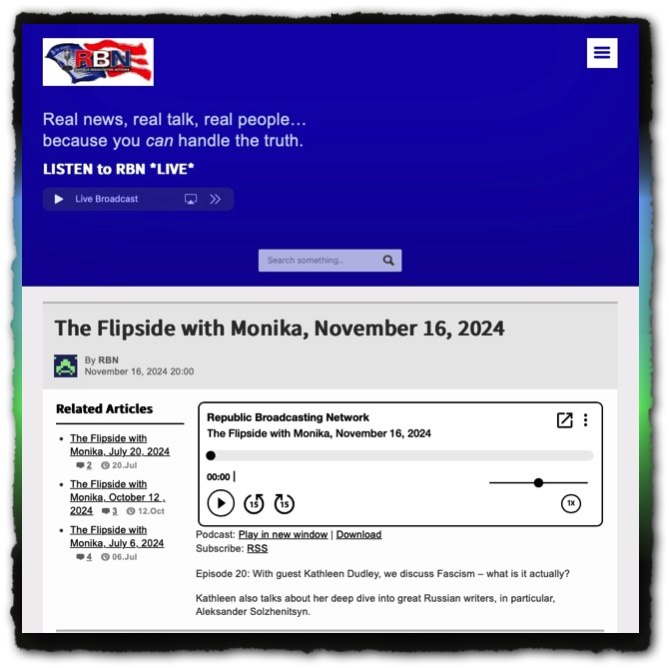

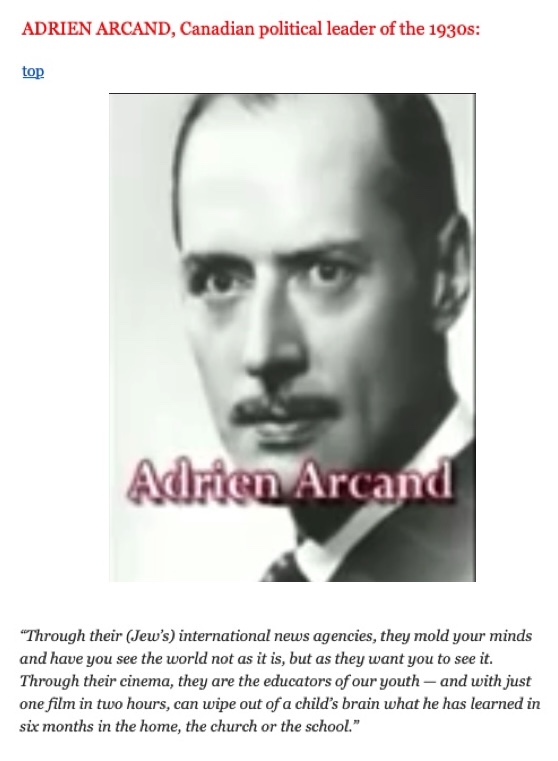


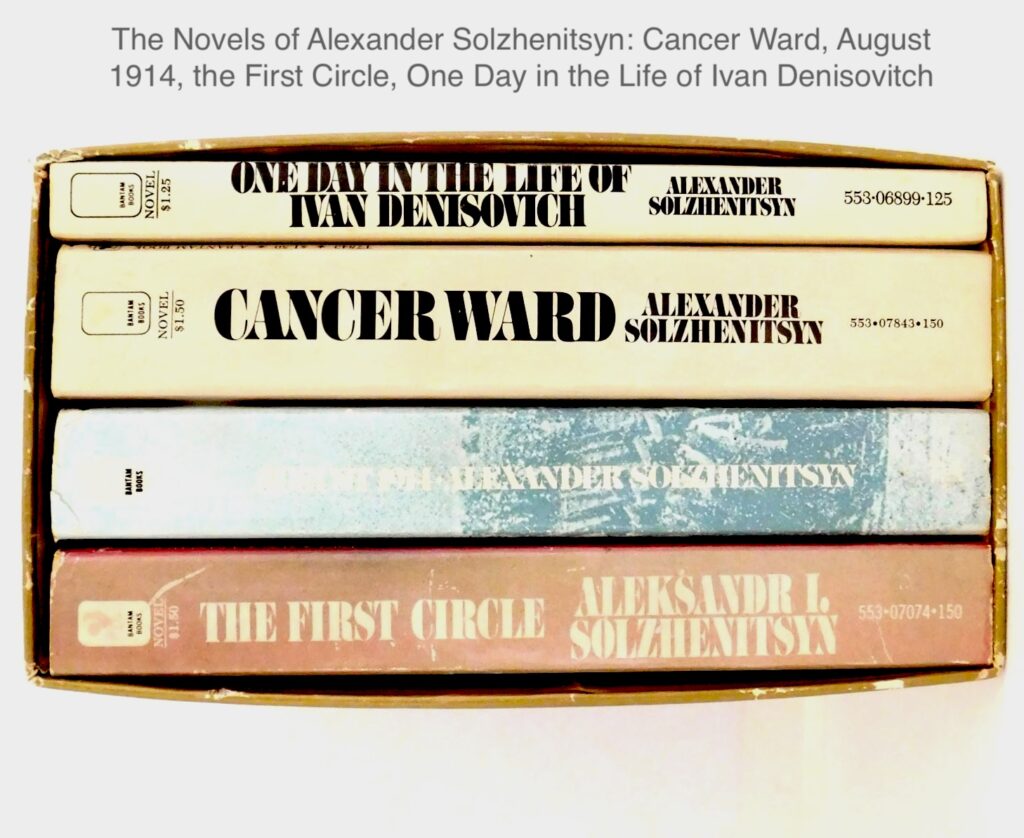
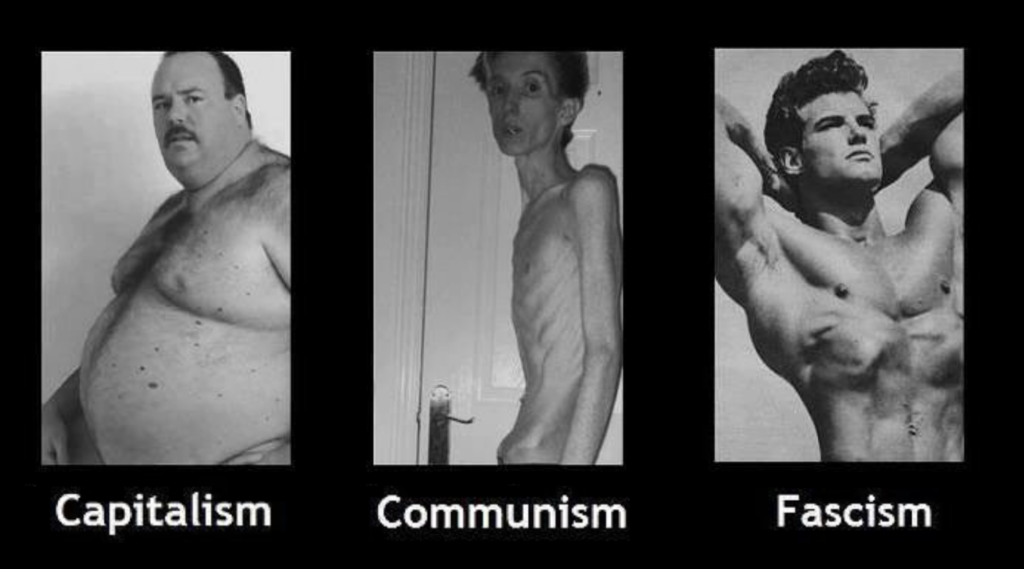

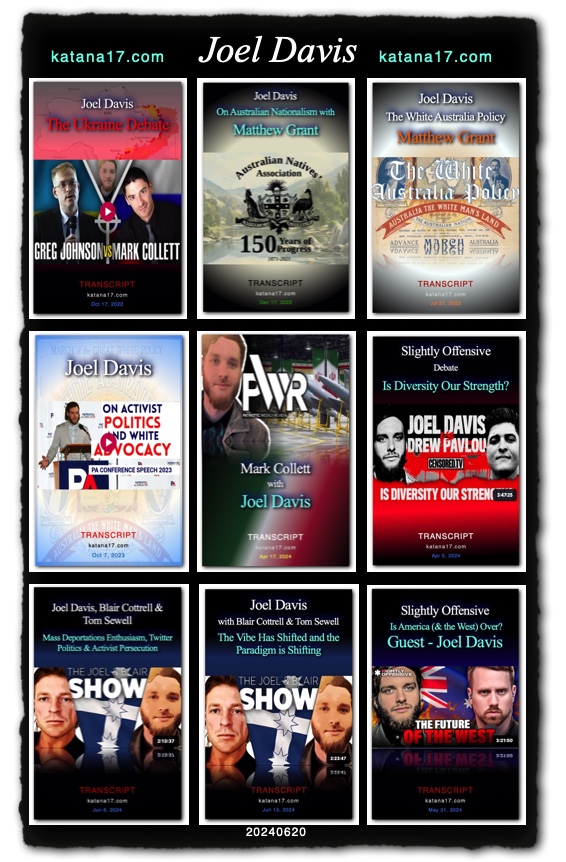

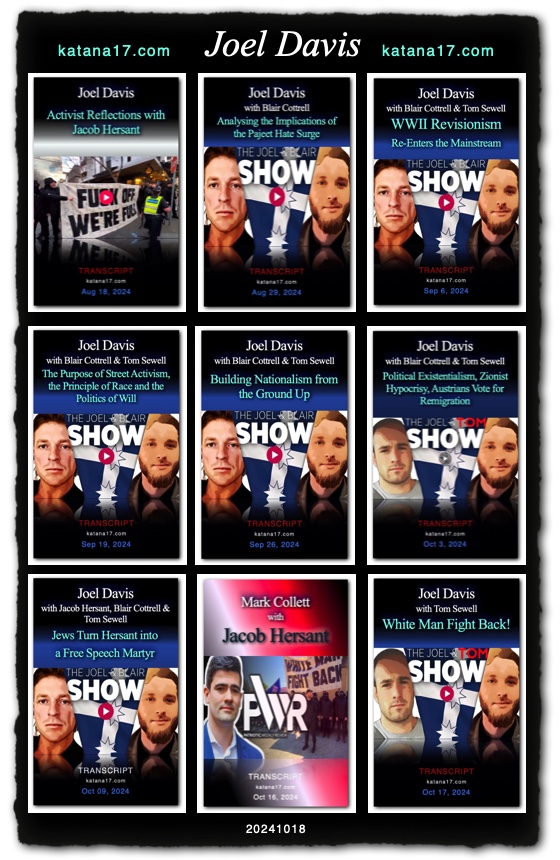
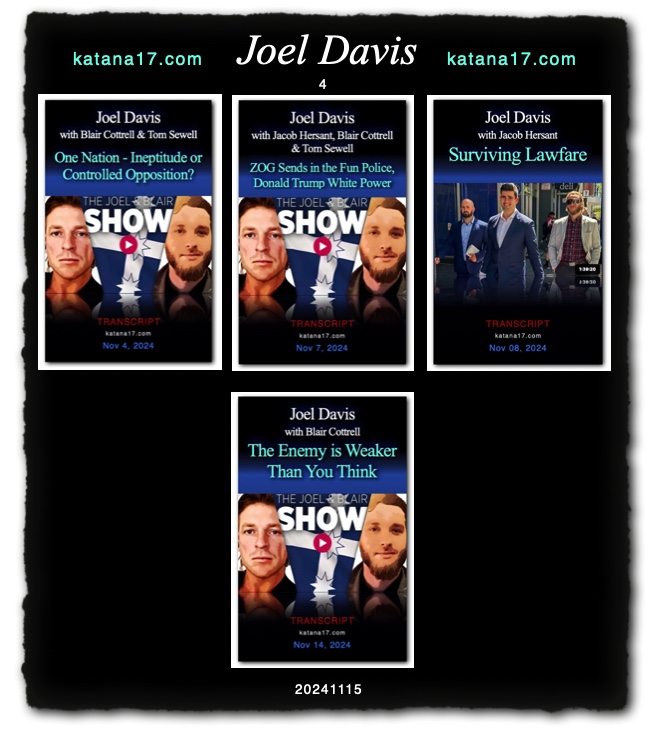

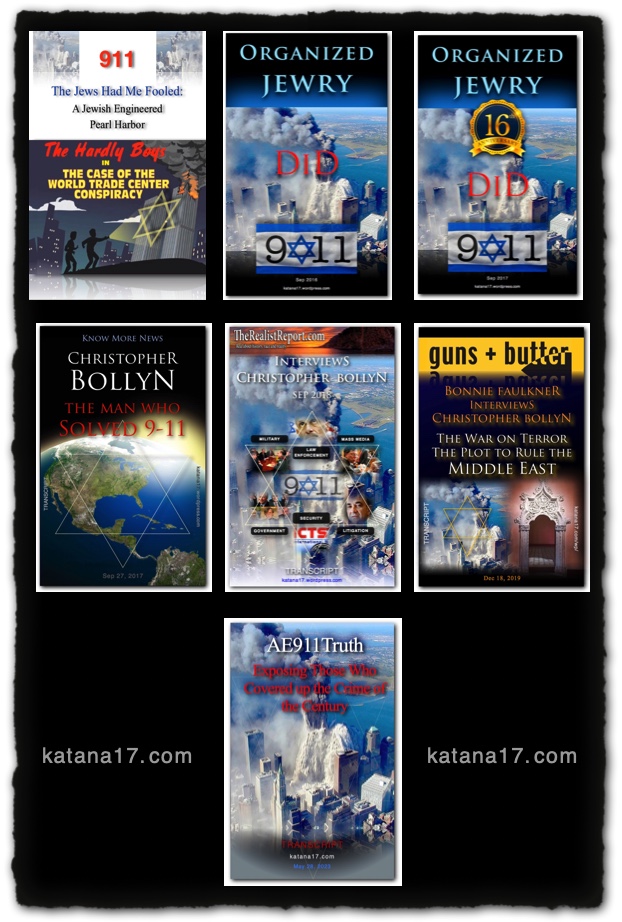
Pingback: Monika Schaefer – The Flipside with Monika – Ep 24 – Prof Tony Hall – Dec 21, 2024 – Transcript | katana17
Pingback: The Flipside with Monika – Ep 36 with Jürgen Neumann on Ernst Zundel – Mar 22, 2025 – Transcript | katana17